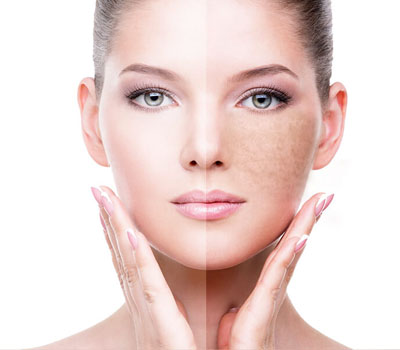Pigmentation Treatment
- Home
- Pigmentation Treatment

Pigmentation Treatment
Pigmentation refers to the coloring of the skin. Treatment for pigmentation issues depends on the specific type and cause of pigmentation. Here are some common pigmentation treatments:
Topical Treatments:
- Skin Lightening Creams: These creams often contain ingredients like hydroquinone, kojic acid, arbutin, or licorice extract to lighten dark spots.
- Retinoids: Retinol and prescription retinoids can promote cell turnover and reduce pigmentation.
Chemical Peels:
- Glycolic Acid Peel: This type of chemical peel can exfoliate the skin, improving pigmentation.
- TCA (Trichloroacetic Acid) Peel: Deeper peels can target more severe pigmentation issues.
Laser Therapy:
- Intense Pulsed Light (IPL): IPL treatments target pigmented areas and can be effective for sunspots and freckles.
- Fractional Laser: Fractional laser treatments can improve overall skin tone and texture.
Microdermabrasion:
- This non-invasive procedure exfoliates the skin, helping to reduce pigmentation.
Cryotherapy:
- Liquid nitrogen is used to freeze and remove pigmented lesions.
Prescription Medications:
- Topical Steroids: In some cases, steroids may be prescribed to reduce inflammation and pigmentation.
- Topical Retinoids: Prescription-strength retinoids can be more potent than over-the-counter options.
Cosmetic Procedures:
- Microneedling: This procedure involves creating tiny punctures in the skin to stimulate collagen production and improve pigmentation.
- Dermabrasion: A more aggressive exfoliation method that can be used for certain pigmentation issues.
Natural Remedies:
- Some people explore natural remedies like aloe vera, lemon juice, or vitamin E oil, although the effectiveness can vary.
Sun Protection:
- Sunscreen is crucial for preventing further pigmentation. Use a broad-spectrum sunscreen with a high SPF.
Consultation with Dermatologist:
- For personalized advice, consult with a dermatologist who can assess your specific pigmentation concerns and recommend appropriate treatments.
It's essential to note that pigmentation issues can be challenging to treat, and results may vary. Professional guidance is recommended to determine the most suitable treatment plan for your skin.

